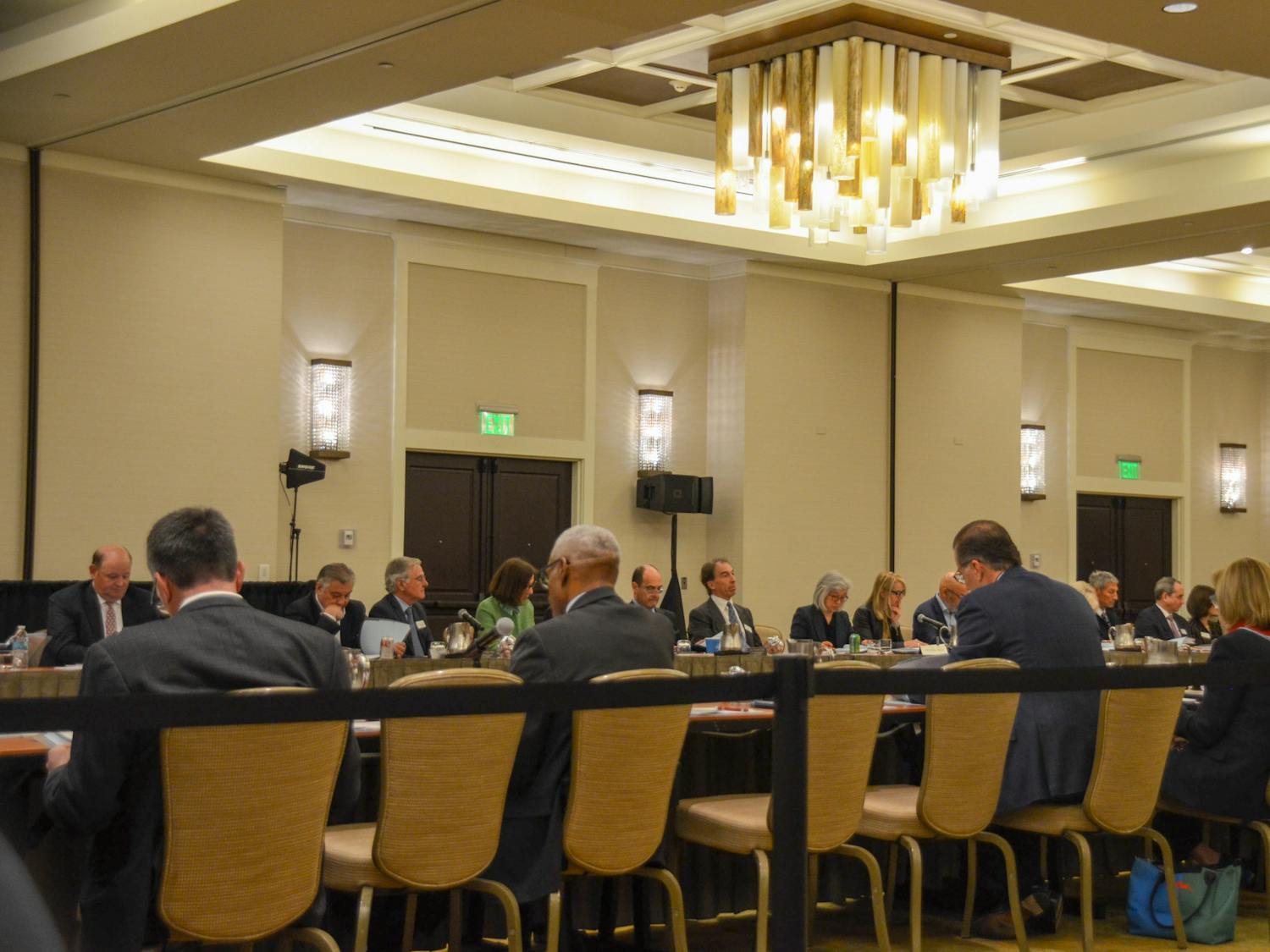With the possibility of a war against Iraq looming, Penn faculty and staff held a teach-in last night to express their opposition to the war as well as educate and inform the greater University community.
Two weeks ago, 47 members of Penn's faculty and staff met to discuss the current national political agenda for the war on Iraq. Fewer than 10 days later, that group grew to almost 170, forming an organization called Faculty and Staff Against the War. The group then moved quickly to organize a teach-in.
The teach-in brought together a panel of five Penn professors who shared their views on the threat of war.
Students, faculty and staff took up the seats, aisles and doorways of the Huntsman Hall classroom. The discussion was also broadcast to an adjacent classroom, allowing the remarks from the speakers to be heard by a crowd of roughly 250 people.
The teach-in was led by Walter Licht, a History professor and associate dean of the School of Arts and Sciences. He warned that a "rush to war is coming without much criticism."
"The breaks should be applied now," he said, encouraging mobilization on the Penn campus as well as around the world. Licht introduced the faculty members who participated in the teach-in, noting that he had asked those with pro-war viewpoints to speak as well -- however, none accepted.
The first faculty presentation was given by Political Science Professor Rogers Smith, who addressed the concept of the "New American Empire." He claimed that the United States can be described as an imperial nation as it makes efforts to maintain its status as a super power and carry out a preemptive war.
Smith recognized, just as Spiderman did, that "with great power comes great responsibility," but that even the most powerful nation should embrace a multi-lateral and peaceful solution to conflict. He urged that the U.S. should not go "striking at danger wherever it may be perceived in the name of the empire."
Political Science Professor Ian Lustick began his discussion by fixing a small American flag onto the podium, noting that this was the beginning of an anti-war movement and that every demonstration required a flag.
"Why the war? Where is the demand? Why now?" Lustick questioned. "But none of these questions can be answered, because the war was not developed in response to a demand."
Lustick argued that the Bush administration has grabbed hold of the fear that has grown out of last year's terrorist attacks, using it to bolster their ratings in the polls and create a "supply" that could lead the country into a war for which there is little demand.
The third political science professor to speak was Robert Vitalis, who dealt with the consequences of a war with Iraq.
"In reality, we cannot say what a war's consequences will be," Vitalis admitted. "Those analysts who predict the outcome [of a war with Iraq] are telling you more about their own biases."
Vitalis noted that in the aftermath of a war with Iraq, the war's effects would be difficult to distinguish from events that would have taken place anyway. And even in light of such effects, he claimed that "life would be more or less the same."
Vitalis warned his audience not to base convictions regarding a U.S.-Iraq war on potential consequences that cannot be predicted. "War can only be opposed on principle," he said.
Edward Herman, a professor emeritus of Finance, discussed America's relationship with Saddam Hussein. Tracing U.S. policy with Iraq back to the Reagan administration, Herman highlighted what he described as the "hypocrisy" of the U.S. government as it chose to support Saddam's use of weapons of mass destruction when they were used to fight Iran, but later condemned Iraq for the possession of such weapons.
History Professor Firoozeh Kashani-Sabet dealt with the war's potential impact on Iraqi society. She noted the history of instability of the country, an instability that the U.S. would inherit in the event of a successful war against Iraq.
"Let us hope that the Bush administration contemplates the fate of Iraq, America and the world," she concluded.
College of General Studies Student Melissa Byrne said she saw the teach-in as "a great way to unify the community and listen to rational and intelligent arguments against the war in Iraq."
College junior Spencer Witte also praised the teach-in, adding that he hopes such dialogue continues on campus.
"The legitimacy of the faculty brought out a great number of people," he said. "Although people have divergent opinions on the subject, good things come from dialogue."
However, College sophomore Matt Klapper expressed some criticism of the event.
"I was disappointed with the program as someone who is still wrestling with the debate," he said. "I didn't appreciate that the presentations, with one exception, failed even to attempt to address the many legitimate arguments in favor of U.S. action in Iraq."
Through upcoming events such as informal discussions at college houses, the Faculty and Staff Against the War will try to continue to address this debate and keep the Penn community mobilized in order to prevent what Licht described as a "runaway history."








